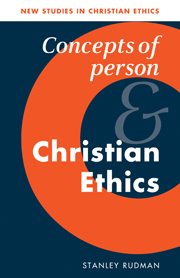Book contents
- Frontmatter
- Contents
- General editor's preface
- Acknowledgements
- List of abbreviations
- Introduction
- PART I ‘PERSON’ IN CONTEMPORARY ETHICS
- 1 ‘Une catégorie de l'esprit humain: la notion de personne’
- 2 Meaning and criteria: person/human being
- 3 Moral personhood in M. Tooley and P. Singer
- 4 Personal identity and responsibility in D. Parfit
- 5 Human subject and human worth
- 6 Resituating personhood: embodiment and contextuality
- PART 2 ‘PERSON’ IN CHRISTIAN PERSPECTIVE
- PART 3 IMPLICATIONS FOR A CHRISTIAN ETHIC
- Conclusion
- Notes
- Select bibliography
- Index of subjects
- Index of names
1 - ‘Une catégorie de l'esprit humain: la notion de personne’
Published online by Cambridge University Press: 02 December 2009
- Frontmatter
- Contents
- General editor's preface
- Acknowledgements
- List of abbreviations
- Introduction
- PART I ‘PERSON’ IN CONTEMPORARY ETHICS
- 1 ‘Une catégorie de l'esprit humain: la notion de personne’
- 2 Meaning and criteria: person/human being
- 3 Moral personhood in M. Tooley and P. Singer
- 4 Personal identity and responsibility in D. Parfit
- 5 Human subject and human worth
- 6 Resituating personhood: embodiment and contextuality
- PART 2 ‘PERSON’ IN CHRISTIAN PERSPECTIVE
- PART 3 IMPLICATIONS FOR A CHRISTIAN ETHIC
- Conclusion
- Notes
- Select bibliography
- Index of subjects
- Index of names
Summary
The concept of person was still ‘fragile’ when, in 1938, Mauss gave the lecture which now forms the title of this chapter. Since then, the cult of personhood has grown to such an extent that we can ask whether it is not in danger of obscuring the truths it originally stood for, because too much attention has been focussed on the individual and the significance of selfconsciousness. 1 The dangers attending the cult of the individual, whether in economic, social or ethical terms, have been frequently noted. If the modern fascination with ‘personhood’ were no more than an expression of liberal individualism, however, it would not be necessary to try to disentangle the theological roots involved in contemporary ethical debate, or to analyse the growth of ideas about intersubjectivity in modern personalism. In fact, the story of ‘personhood’ is rich and complex and contains a number of unresolved challenges for philosophers and theologians, not least in the field of ethics.2 The present study is offered as a modest contribution to understanding some of these, and particularly in the interface between philosophical and theological ethics.
Changes in society and changes in concepts of person interact; changing concepts reflect, confirm or challenge social practices. Because of its strategic significance in Western society, the concept of person has been intimately related to other important concepts.
- Type
- Chapter
- Information
- Concepts of Person and Christian Ethics , pp. 13 - 25Publisher: Cambridge University PressPrint publication year: 1997



